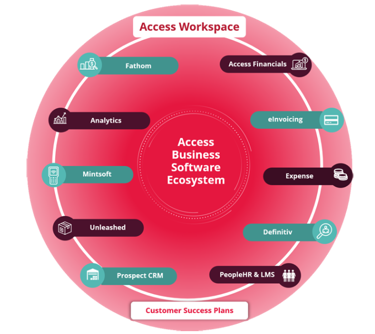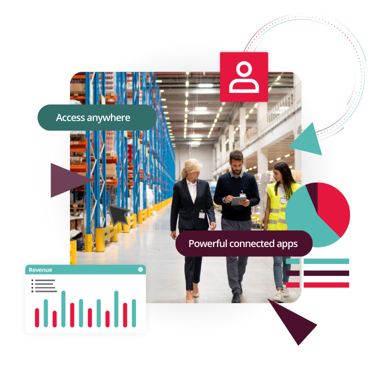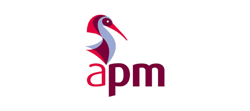ERP Software trusted by over 4,000 organisations worldwide
Flexible cloud ERP software that scales with your business
An ERP solution for your business

Freedom to do more - cloud ERP

Explore Access ERP System
Access ERP is not a one-size-fits-all software package. Our enterprise resource planning suite is made up of a variety of products and solutions that can be combined with one another to connect different parts of your business with meaningful, actionable data.
Success Story
As an eCommerce 3PL specialising in smaller consumer items, such as clothing and cosmetics, Black Bear Fulfillment are 100% Australian owned and operated. Unlike most 3PL’s they aren’t just focused on the logistics and warehousing side of the business, but also, importantly, the customer. Fulfillment is about people as much as it is logistics, and they needed a software solution to help bring this customer-centric vision to life.
I would recommend Mintsoft to anyone - except my competitors
Mack Blunsom: Owner Operator, Black Bear Fulfillment
Hear from some of our customers who utilise Access ERP Software to scale their business
Latest ERP Blogs and Resources
ERP FAQ
What is an ERP system?
An ERP system, also known as an Enterprise Resource Planning System, is a comprehensive software solution that integrates various business processes and functions into a single platform. Its main objective is to streamline and automate business operations, improve efficiency, and enable better decision-making.
By providing a centralised database, an ERP system allows different departments within an organisation to access and share relevant information in real-time. It facilitates the flow of data across departments such as finance, human resources, procurement, inventory management, sales, and customer relationship management. With features like inventory management, order management, supply chain management, warehouse management and financial management, an ERP system helps businesses manage their resources effectively, optimise processes, reduce costs, and improve productivity. It also provides analytical tools and reporting capabilities to generate insights and monitor key performance indicators.
What functions does an ERP system have?
An ERP system has various functions that include:
- Finance and accounting: Managing financial transactions, budgeting, and financial reporting.
- Human resources: Managing employee information, payroll, benefits administration, and training.
- Inventory management: Tracking inventory, procurement, order management, and supplier management.
- Manufacturing: Planning production, scheduling, quality control, and tracking of materials.
- Sales and customer relationship management (CRM): Managing sales orders, customer data, and customer support.
- Financial Reporting and analytics: Generating reports, analysing data, and providing insights for decision-making.
Why do you need an ERP software?
Organisations need ERP software to streamline their business processes, improve efficiency, and enable better decision-making. An ERP system integrates different functions and departments into a single platform, eliminating data duplication and ensuring data integrity. It provides a centralised database that allows real-time access and sharing of information across the organization.
ERP software automates tasks, improves communication and collaboration, and offers analytical tools for monitoring key performance indicators. By consolidating data and processes, ERP software helps organisations manage resources effectively, optimise processes, reduce costs, and improve productivity.
Who uses an ERP System?
ERP systems are employed by diverse organisations across industries. Manufacturers, retailers, professional services, financial institutions, government agencies, educational institutions, healthcare providers, nonprofits, SMEs, construction firms, and agricultural companies all benefit from ERP software to streamline operations, enhance data management, and make informed decisions.
What are the benefits of ERP software for Businesses?
There are numerous benefits to using ERP software including:
- Streamlined Operations: ERP software integrates various business processes, from finance to Human resources and inventory management, streamlining operations and improving efficiency.
- Data Accuracy: With centralised data storage, ERP ensures data consistency and accuracy, reducing errors and enhancing decision-making.
- Improved Productivity: Automation of routine tasks, freeing up employees to focus on more strategic activities.
- Enhanced Visibility: Real-time reporting and analytics give businesses a comprehensive view of their performance, enabling informed decisions.
- Scalability: ERP software can adapt to growing businesses, accommodating increased workloads and changing needs.
- Compliance: The software helps in adhering to industry regulations and standards, reducing compliance risks.
- Customer Satisfaction: Better order processing and inventory management lead to improved customer service.
- Cost Savings: Efficient resource allocation and reduced operational costs contribute to higher profitability.
The Access Group's financial management software is a great first step to embracing a full ERP solution if that’s what is right for your business. It can be integrated as part of a full ERP suite or used independently as a comprehensive and modern standalone accounting solution.
What is an ERP system used for?
An ERP (Enterprise Resource Planning) system is a comprehensive software solution used by organisations to efficiently manage and integrate core business functions. It enables businesses to streamline processes related to finance, inventory, production, procurement, and human resources. By providing real-time data and insights, ERP systems help organisations make informed decisions, reduce manual work, enhance collaboration, and achieve operational efficiency.
How do ERP systems work?
An ERP system works by integrating and consolidating multiple functions of your business's operations into a single software system. Apart from foundational applications such as HR, payroll, finance, and CRM, you also have the flexibility to pick and choose industry-specific functions to meet your organisation's needs and to achieve that sought-after 360-view of your business. Since no two businesses are the same, industry-specific functions ensure an ERP system is fit for purpose and can include everything from financial management, inventory management, expense management, warehouse management and distribution to planning and scheduling.
As with any technology, ERP has evolved in many forms from on-premise models that used physical client servers, to cloud-based software with remote web-based access and boosted security.
How long does it take to implement an ERP system?
The time required for ERP implementation varies widely based on the complexity of the system and the organization's size. It can range from several months to a few years. Typically, smaller businesses can implement ERP systems faster than larger enterprises. When implementing an ERP system through The Access Group, the duration can vary depending on factors like the scope of the project, the specific modules being implemented, and the organisation's readiness.
- Small to Medium Businesses: Small to medium-sized businesses often take around 3 to 6 months to implement an ERP system. These businesses typically have fewer complex processes, making for a quicker deployment.
- Larger Enterprises: Larger enterprises with more extensive operations and customization needs may require 6 months to a year or more for a complete ERP system implementation.
How to select an ERP system?
Selecting the right ERP (Enterprise Resource Planning) system is a crucial decision that requires careful consideration. Here are steps to guide you in selecting an ERP system:
- Assess Your Needs: Begin by thoroughly understanding your organisation's requirements. Involve key stakeholders from various departments to identify specific pain points and goals.
- Set a Budget: Determine your budget for the project, including not just the software but also implementation, training, and ongoing maintenance.
- Research Vendors: Explore vendors like The Access Group known for their expertise in your industry. Investigate their track record, customer reviews, and the functionality they offer.
- Demo and Evaluate: Request demonstrations from shortlisted vendors. Assess how well their system aligns with your needs, including scalability and customization options.
- Consider Cloud vs. On-Premises: Decide whether a cloud-based or on-premises ERP system suits your organisation's infrastructure and security requirements.
- Check Integration: Ensure the ERP system seamlessly integrates with your existing software and systems.
- Support and Training: Evaluate the vendor's support services and training programs to empower your team.
The Access Group employs a consultative approach, working closely with clients to understand their unique needs. They offer tailored ERP solutions for various industries, providing expert guidance throughout the selection process, from needs analysis to customisation options, ensuring the chosen system aligns with organisational objectives and budget constraints. Their commitment to ongoing support ensures long-term success.
What's the difference between an ERP and CRM?
ERP and CRM are both essential software solutions, but they serve different purposes. ERP manages an organisation's internal processes, such as inventory management, accounting, and production planning. In contrast, CRM focuses on customer-related activities, including sales, marketing, and customer service, aiming to improve customer interactions and relationships. While ERP and CRM systems can integrate with each other, their primary functions cater to different aspects of business operations.
Our in-depth guide will provide you insights into the difference between ERP vs CRM, shining a light on the benefits of each system and how they can help you reach your business goals.

 UK
UK
 SG
SG
 MY
MY
 US
US
 IE
IE





















